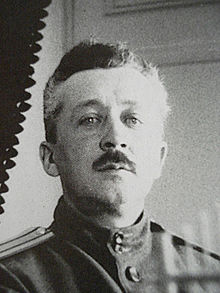- Eugene Kobylinsky
-
Colonel Yevgeny Stepanovich Kobylinsky (Russian: Евгений Степанович Кобылинский) (1875–1927) was a Russian military officer who served as the commander of the special detachment at Tsarskoe Selo and Tobolsk, where he oversaw the imprisonment of former Russian Emperor Nicholas II, who abdicated his throne after the February Revolution of 1917.
Biography
Yevgeny Stepanovich Kobylinsky was born into a noble family in Kiev on September 29, 1875 (O.S.). He graduated from the Cadet Corps military school.
On January 1, 1909 (O.S.) he became a lieutenant in the St. Petersburg Imperial Guard regiment. He served on the front lines during the Great War and was decommissioned after sustaining major injuries.
After Russian Emperor Nicholas II abdicated the throne in February 1917, Kobylinsky became an employee of the Provisional Government which succeeded Nicholas. On March 1 (O.S.) Kobylinsky was appointed commandant of the Alexander Palace, where the former Russian Imperial Family was imprisoned. He attended the family and forty-five retainers when they departed for the city of Tobolsk in Siberia that August.
After the 1917 October Revolution, a Bolshevik regime was established and Kobylinsky was replaced by Bolshevik officers, who employed a much stricter regime than he had.
During the Russian Civil War, Kobylinsky was invited to join the White Army in June 1918. He initially refused, but in December of that year enlisted as a White officer under the command of Admiral Aleksandr Kolchak, for whom he fought until he was captured near Krasnoyarsk the following December and sent to a concentration camp. In exchange for freedom, he joined the Red Army in September 1920, and worked his way up to the position of senior clerk and eventually treasurer of the Fifth Army.
He was hired as an accountant by the Rybinsk County Bureau of Statistics from July 1921, and soon after married Claudia Bitner—a former tutor to the Imperial children from Tsarskoe Selo—with whom he had a son, Innokenty.
In 1926 a Tobolsk resident, Paulina Mežanc, suggested in an interrogation that Kobylinsky was in possession of jewelry that once belonged to the Imperial Family. An investigation was undertaken from June to September 1927. The alleged jewelry was never found, but he was revealed to have had connections to the White Army of Yugoslavia. He was fired from his job, charged with "monarchical conspiracy" against the Soviet state, and was killed by firing squad in Moscow, along with eight others, that December.
Categories:- People of the Russian Civil War
- 1875 births
- 1927 deaths
- Nicholas II of Russia
Wikimedia Foundation. 2010.

